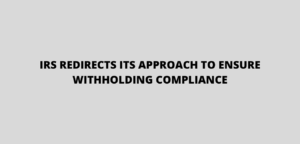How To Handle a Tax Bill You Can’t Pay

How To Handle a Tax Bill You Can’t Pay
What could be more chilling than receiving a notice from the IRS that you owe a huge tax bill? The answer: the realization that you don’t have the money to pay off said tax bill. So what should you do if you find yourself in this situation? There is hope.
First off, never ignore such a situation and just hope that it will go away. That won’t work. Instead, face it head on. A good place to start is to contact a tax professional. The IRS does offer several options for people in this situation, but you might not know which is the best option for you. Therefore, meeting with a tax pro is usually a good idea.
The IRS actually offers several payment options for taxpayers in the hole, if they qualify. You can go ahead and pay it off directly from your bank account via IRS Direct Pay. You can also petition the IRS for an installment agreement wherein you agree to pay off the debt monthly. You can request an offer in compromise, as well, which if accepted could lower the amount you have to pay back.
However, as mentioned you must qualify for this option and part of that includes having debt and penalties of $50,000 or less, combined. No matter which payment method you choose you should do everything you can to pay off your debt in full as quickly as possible. The longer you delay payment the stiffer the penalties and the interest will get
Want to learn more? Contact us
Follow GROCO on Facebook
IRS Redirects Its Approach To Ensure Withholding Compliance
IRS Redirects Its Approach To Ensure Withholding Compliance The IRS has released temporary and proposed regulations (REG-162813-04 & TD 9196) under IRC section 3402 modifying employer requirements to furnish copies of Forms W-4, Employee’s what is withholding compliance program Allowance Certificate, to the IRS. The temporary regulations provide that employers are no longer required to…
Spirituality In Business Leadership
Spirituality In Business Leadership By Alan Olsen For many people, even mentioning religion, or a religious topic in the workplace can be taboo. Often, people are very sensitive about religious topics so most people choose to be quiet about the subject, no matter what the business situation might be. Even some of the most devout…
IRS Publication 4681: Canceled Debts, Foreclosures, Repossessions, and Abandonments (For Individuals) For use in preparing 2008 Returns
IRS Publication 4681: Canceled Debts, Foreclosures, Repossessions, and Abandonments (For Individuals) For use in preparing 2008 Returns For use in preparing 2008 Returns Link: http://www.irs.gov/pub/irs-pdf/p4681.pdf This publication explains the federal tax treatment of canceled debts, foreclosures, repossessions, and abandonments. Generally, if you owe a debt to someone else and they cancel or forgive that debt,…
Update on Homebuyer’s Credits
Update on Homebuyer’s Credits Dear Client & Friends: On November 6, the President signed into law H.R. 3548, the ”Worker, Homeownership, and Business Assistance Act of 2009.” The new law extends and generally liberalizes the tax credit for first-time homebuyers, making it a much more flexible tax-saving tool. It also includes some crackdowns designed to prevent…


